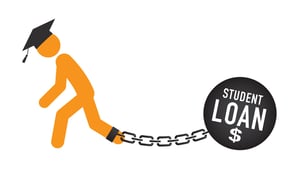Many (if not most) graduating law students will have over $100,000 in law school debt (in addition to any undergrad loans), so the issue of how to pay both student loans and contribute towards one's retirement is a highly relevant one.
Last Friday, the IRS issued a ruling allowing employers to "match" student loan repayments of employees even if the employees are not making 401(k) contributions.
That ruling was the subject of a recent blog post by David Guadagnoli, tax partner and head of Sullivan's Employment & Benefits group, and Amy Sheridan, tax partner and head of Sullivan's Hiring Committee.
The post was originally published on the firm's InHouseGo2 blog, which centers on issues of interest to corporate general counsel. The post can be found here, or can be read in its entirety below.
************
A new ruling was released last Friday by the Internal Revenue Service that presents a very intriguing possibility for employers looking to economically support employees with student debt burdens. The idea is that an employee can receive the economic equivalent of a 5% matching contribution, even if he or she is not actually making 401(k) contributions but is instead actively paying down student debt. The ruling, which can be relied upon only by the taxpayer to whom it was issued, addresses the very technical question of whether such an arrangement violates the so-called contingent benefit rule under Internal Revenue Code Section 401(k)(4)(A), a particularly arcane area of the arcane law of employee benefits.
Although the facts are a bit unclear, the basic structure described in the ruling involves a 401(k) plan that appears to provide a 5% of compensation matching contribution (if the employee is making 401(k) contributions of at least 2% of compensation) or a 5% of compensation "profit sharing" contribution (if the employee is making student loan repayments of at least 2% of compensation). There is a last day requirement and various other conditions, but the basic idea is that the employee can receive the economic equivalent of a matching contribution even if he or she is using dollars to pay down student debt rather than making 401(k) contributions. Critical to the conclusion seems to be the fact that the employee could conceivably be, but is not required to be, both making 401(k) contributions and paying down student debt.
The IRS ruling concludes that such an arrangement does not violate the contingent benefit rule. The ruling does not directly address other testing issues, aside from noting that amounts contributed as matching contributions are subject to the ACP test and amounts contributed as "profit sharing" contributions are not. How "profit sharing" contributions are tested is not addressed.
Although the ruling leaves open a host of document and compliance related issues, it is a new option for employers looking to support employees facing the "save for retirement" vs. "pay down student debt" problem.



